Content is King, you hear it everywhere. It’s the most overused marketing phrase of 2012.
But exactly why is content so important to your marketing program?
Turns out Google has had a heavy hand in this trend (surprise, surprise).
Here are 7 ways the Big G is pushing quality content to the forefront of the marketing conversation.
1. Google Panda
 First rolled out in February 2011, Google Panda was a major move by the search engine to combat rampant SERP (search engine results page) manipulation by black hat SEOs and other purveyors of poor quality content.
First rolled out in February 2011, Google Panda was a major move by the search engine to combat rampant SERP (search engine results page) manipulation by black hat SEOs and other purveyors of poor quality content.
More than your average algorithmic update, Panda is an ongoing filter that weeds out web pages with poor, superficial content that were previously ranked highly for popular keywords.
Why Google Panda Rewards Quality Content
It penalizes bad quality content by making it much more difficult to find on Google. Conversely, high quality websites with informative, original content is being rewarded with higher rankings and more traffic.
2. Fresh Content Ranks Higher
Fresh content became a bigger priority for Google with their Caffeine web index update in July 2010. But it wasn’t until November 2011’s Freshness Update that fresh content became more apparent in the search results. Now if you search on something time sensitive, you’ll see content published most recently show up at the top of the SERPs.
The graph below from Justin Briggs’ epic post, Methods for Evaluating Freshness gives a nice overview of how Google’s freshness algorithms probably work. The graph depicts a high ‘freshness score’ immediately after an article’s publish date, a rapid decline and then a slow leveling off over time.
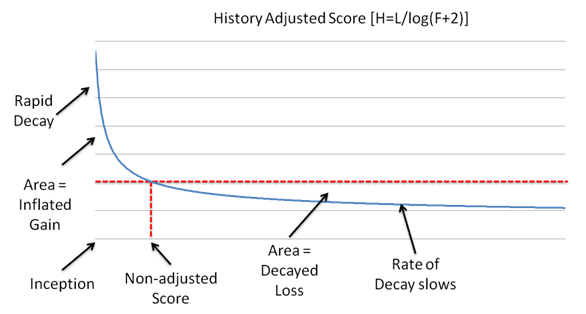
Why the Freshness Update Rewards Quality Content
All things being equal, your content will receive significantly higher weight closer to its publishing date. In other words, a blog post you wrote yesterday will have a greater chance of ranking higher than a two-year old web page on the same topic. Obviously, this encourages content creators to publish more often.
3. Link Spam Penalties
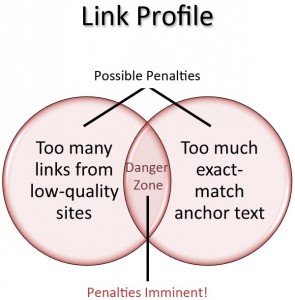
Everyone knows that inbound links are important to your rankings on the search engines.
Unfortunately, they’re easy to manipulate. Paid link brokers like BuildMyRank.com and Authority Link Network have made a great living at selling “link spam” to websites. Companies could just buy into these link networks to improve their rankings instead of earning links the hard way through quality content.
For reputable white-hat SEOs, this was a source of constant frustration.
But now it appears Google is getting more aggressive about this problem. Since November 2011, many of these paid links have simply been ‘de-indexed’ from Google. In other words, they don’t exist in Google anymore and therefore provide no SEO value whatsoever.
Why Link Spam Penalties Rewards Quality Content
Like Google Panda, link spam penalties will hurt those who are manipulating the system. Conversely, sites with good quality content and natural “editorial” links that have been built up over time, will increase their Google rankings.
4. (Not Provided) in Your Analytics Reports
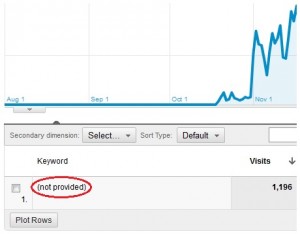
Don’t worry, it’s not you, it’s Google.
Back in October, 2011, Google announced they would start encrypting (HTTPS) searches for people who are logged on to their Google account at the time of their search. Presumably this was done to ensure security for the people doing searches.
But it created an undesirable side-effect that prevents the referrer data from being passed to any analytics tool. In other words, for those searches, the marketer will have no idea what keyword was used to find their website.
Google has stated that this would affect less than 10% of all searches. But many industry pundits have cited significantly higher numbers. Search Engine Land reported in November that over 14% of their Google traffic was “Not Provided”.
Why (Not Provided) Rewards Quality Content
Marketers now have less access to free organic search keyword data. This makes it more difficult to target specific keywords and encourages them to cover all the bases with a bigger content footprint.
5. Over Optimization Penalty
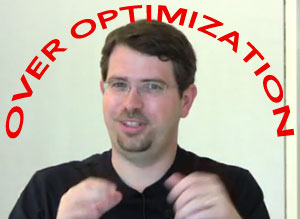
At the 2011 South by Southwest conference, Matt Cutts alluded to a Google update that will penalize “over optimized” websites’.
“The purpose is to level the playing field…to give sites that have great content a better shot at ranking above sites that have content that is not as great but do a better job with SEO… And the idea is basically to try and level the playing ground a little bit.”
Why the Over Optimization Penalty Rewards Quality Content
If you’re producing good quality content but don’t have the time or budget to pull out all the SEO tricks, you’ll like this one. This is yet another attempt by the search engine giant to dampen black hat SEO’s ability to game the system. (NOTE: As of this writing, Google has not released this update but it should be out sometime in Q2 2012. )
6. The Rise of Social Content Sharing
People are much better indicators of good quality content than machines. If people share your content on any of the social networks like Facebook, Twitter or Google Plus, it’s probably pretty good.
The search engines are finally coming around to this notion. Both Google and Bing have acknowledged publicly that social sharing signals are now major search engine ranking factors.
People share content in huge numbers. According to a recent study by AOL and Nielson, 23% of social media messages have links to content.
Why Sharing Rewards Quality Content
In the end, we create web pages to be read by people. If your content resonates with your audience, it’ll get shared through social media. When the search engines see that, they’ll reward you with higher rankings. Win-Win-Win-Win.
7. Rel = Author Support in Search Results
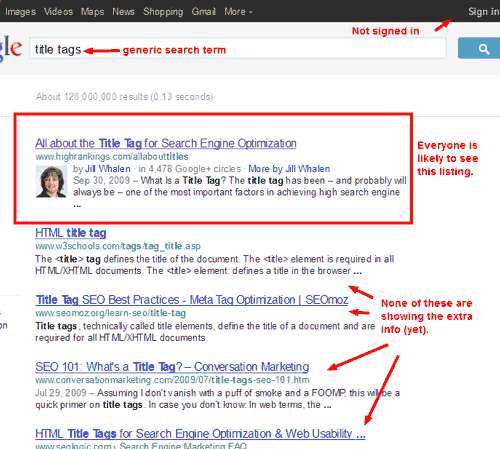
This means that for every piece of content that you create, you can take credit for it and have your picture show up next to the content in Google search results.
Learn how you can do this for your own content from this excellent AJ Kohn post, “How to Implement Rel=Author“.
Why Rel=Author Rewards Quality Content
Authors like to get recognition for their work. Their name is their brand. If their name and photo are displayed next to an article they wrote, you can be sure this will motivate them to create quality content!
What do you think? Are there other search engine updates that have contributed to content marketing revolution?